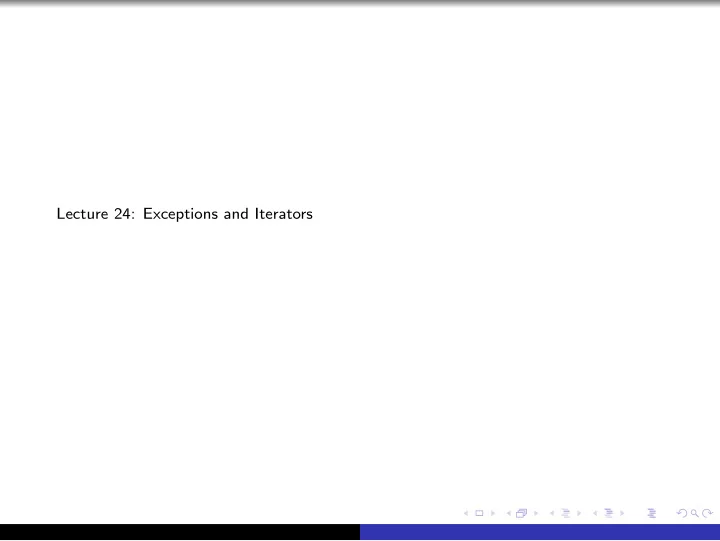

Lecture 24: Exceptions and Iterators
Exceptions Python alerts us of an extraordinary event by throwing an Exception >>> l = list(range(10)) >>> l[10] Traceback (most recent call last): File "<stdin>", line 1, in <module> IndexError: list index out of range An IndexError is a type of exception All exceptions are classes that inherit from the BaseException class
Exceptions We can separate our code’s normal control flow from error handling using try and except : 1 l = list ( range (10)) 2 try : 3 l[10] 4 except IndexError as ie: 5 print (”Caught an IndexError: {} −− moving on”. format (ie)) 6 7 print (l[0]) produces: Caught an IndexError: list index out of range -- moving on 0
Exceptions But only catch what you can handle by catching the most specific exception class(es) 1 def int fraction(num, denom): 2 try : 3 return num // denom 4 except Exception as e: 5 print (”Can’t divide by zero −− returning 0”) 6 return 0 7 This code catches and handles a ZeroDivisionError properly But other exception classes also inherit from Exception
Exceptions But only catch what you can handle by catching the most specific exception class(es) 1 def int fraction(num, denom): 2 try : 3 return num // denom 4 except Exception as e: 5 print (”Can’t divide by zero −− returning 0”) 6 return 0 7 This code catches and handles a ZeroDivisionError properly But other exception classes also inherit from Exception >>> int_fraction(3, ’a’): Can’t divide by zero -- retuning 0 0 We mistakenly handle a TypeError as if it were a ZeroDivisionError
Exceptions To throw an exception, raise the name of a class that is derived from BaseException 1 next (self): def 2 if self. has more items(): 3 return self. next item() 4 else : 5 raise StopIteration() 6 Iterators depend on exeptions to indicate they are out of items
Iterators Recall that something is iterable if it supports the iter function—that is the method iter is defined—and returns an iterator. An iterator is something that supports the next function—that is, the method is defined; next throws a StopIteration when the iterator is empty; and returns itself under an iter call. Iterators may be defined using classes (this lecture) or with generators (next lecture).
An Iterator for Squares 1 class Squares: 2 3 init (self, threshold=None): def 4 self. state = 1 5 self. threshold = threshold 6 7 def below threshold(self): 8 return self. threshold is None or self. state ∗∗ 2 < self. threshold 9 10 iter (self): def 11 return self 12 13 def next (self): 14 if self. below threshold(): 15 sq = self. state ∗∗ 2 16 self. state += 1 17 return sq 18 else : 19 raise StopIteration()
An Iterator for Even Squares 1 class EvenSquares(Squares): 2 3 def next (self): 4 sq = super (). next () 5 while (sq % 2 != 0): 6 sq = super (). next () 7 return sq
Recommend
More recommend